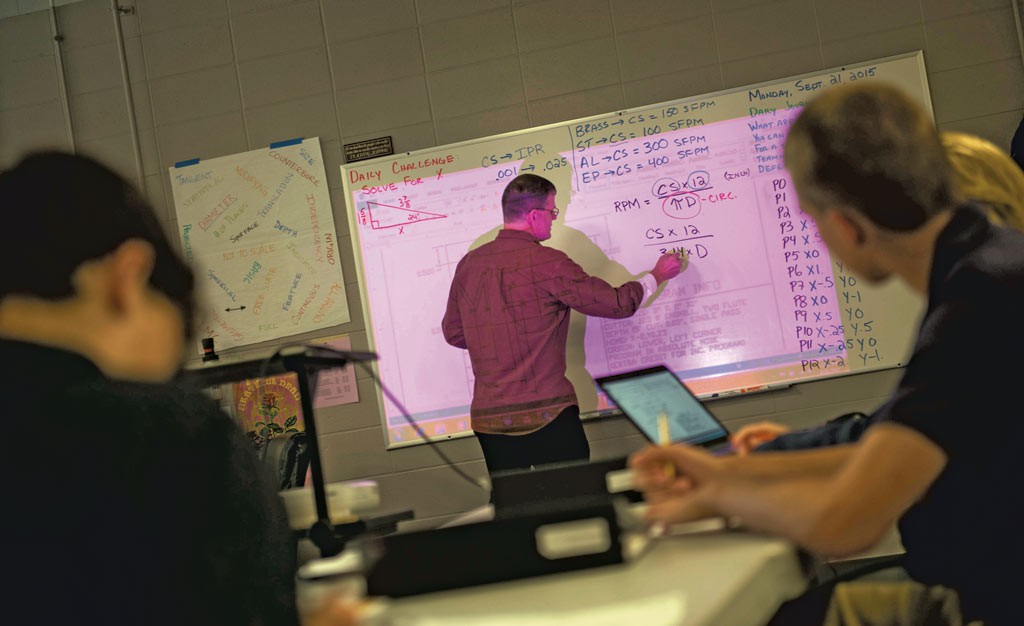Did you get an Apple Watch this year? The debut of the smartwatch was one of Mashable’s top 10 Tech Stories of 2015, along with the data breach at Ashley Madison and the introduction of the taco emoji. But none of Mashable’s stories impacted the Vermont tech scene as much as the sale of IBM’s chip-making division to GlobalFoundries.
As the year draws to a close, we at Seven Days decided to make our own list of the top 10 tech stories that influenced Vermont’s growing tech ecosystem. We reviewed the stories we wrote and noted, both in Seven Days and in the Vermont Tech Jam weekly newsletter, and we reached out to a couple dozen local academics, organizers, entrepreneurs and tech enthusiasts for a little help.
Here, then, are our picks for the top 10 Vermont tech stories of 2015. Feel free to suggest your own in the comments:

From left, GlobalFoundries executives Janette Bombardier, Mike Cadigan and Brian Harrison speak at a press conference at their Essex plant. Photo: MARK DAVIS
1. GlobalFoundries buys IBM’s chip unit. On July 1, Abu Dhabi-based GlobalFoundries completed its purchase of IBM’s chip-making division, which included the company’s Essex Junction plant, one of the state’s larges employers. Its 4,000-person staff turns out more than 10 billion computer chips a year, many of which end up in smartphones. “This sale could have been devastating for Vermont families and our economy,” says David Bradbury of the Vermont Center for Emerging Technologies. But so far, despite a small layoff and a 100-worker buyout, things seem to be going well. “Global Foundries has been nothing but a positive buyer and new partner for Vermont,” he notes. In November, GlobalFoundries announced it invested $55 million in the plant to boost chip production. But then, at the end of the month, rumors surfaced that GlobalFoundries itself might be for sale — to the Chinese government. How do you say “stay tuned” in Chinese?

Mike Schirling. Photo: MATTHEW THORSEN
2. BTV Ignite reignites. In 2013, Mayor Miro Weinberger announced that Burlington had been selected to join US Ignite, a coalition of cities with gigabit broadband networks — it could help the city find new ways to leverage its investment in Burlington Telecom, and spur economic development in the area. But despite all the hoopla around the announcement, nothing much happened, probably because the effort, dubbed BTV Ignite, was led by a committee of volunteers. That changed in 2015, when eight stakeholders — including the University of Vermont Medical Center, Champlain College, and Burlington Electric — pitched in $25,000 each to allow BTV Ignite to hire its first executive director. In September, they chose former Burlington Police Chief Mike Schirling for the job. As chief, Schirling designed a records management system that is now used by dozens of departments across the state. In his new role, he’s trying to connect Burlington techies both with their counterparts in US Ignite cities across the country and with each other. Some of his first acts, beyond going on a lengthy “listening tour,” have included bringing representatives from other US Ignite cities to Burlington, and hosting meetings of hackathon and event organizers to introduce everyone and get them all on the same page. Numerous people cited this story as one of the year’s biggest, but noted that it’s still too early to tell whether BTV Ignite will spark real progress. Meanwhile, the city is preparing to sell Burlington Telecom. A committed crew of activists are pushing to keep it local. Burlington city councilors will decide on criteria for the sale in January.
3.  The state’s IT systems are suffering. Frustrations with Vermont Health Connect are nothing new — they’ve been mounting ever since the health care exchange was introduced in 2013. But the problems are bigger than the exchange. Some state agencies desperately need IT system upgrades, but lawmakers are feeling stingy after the Health Connect debacle. And the cost of the upgrades is only rising. Right now, the state is contemplating $1 billion in tech spending over the next five years, and it’s still not clear how we’ll pay for it, or how we’ll make sure we don’t end up with another Health Connect. Sigh.
The state’s IT systems are suffering. Frustrations with Vermont Health Connect are nothing new — they’ve been mounting ever since the health care exchange was introduced in 2013. But the problems are bigger than the exchange. Some state agencies desperately need IT system upgrades, but lawmakers are feeling stingy after the Health Connect debacle. And the cost of the upgrades is only rising. Right now, the state is contemplating $1 billion in tech spending over the next five years, and it’s still not clear how we’ll pay for it, or how we’ll make sure we don’t end up with another Health Connect. Sigh.
4. Cox Automotive buys Dealertack — and Dealer.com. In December 2013, Dealertrack Technologies paid nearly $1 billion for Dealer.com, a homegrown Burlington-based startup that builds online marketing solutions for car dealers. That deal has had a ripple effect on at least one Burlington startup. In the summer of 2015, Dealertrack got gobbled up by Cox Automotive, in a deal worth more than $4 billion. At the “20+ Tech Jobs” panel at the Vermont Tech Jam in October, Dealer.com’s lead technical recruiter, Amy Kakalec, told the audience the company now has 1,125 employees in Burlington. But Cox Automotive is a giant company based in Atlanta, Ga. It sounds like the company is committed to Dealer.com’s Vermont location, but y’all never know how things will turn out. Look at the layoffs this summer at Keurig Green Mountain — owned, in part, by Atlanta-based Coca-Cola (and, now, the investment arm of a billionaire German family.)

Caleb Kenna: STEM Academy teacher Chris Gray in Stafford’s STEM lab
5. K-12 STEM education efforts are blooming. Vermont still has a long way to go to get a maker lab or computer programming classes in every school, but the state made some significant strides in STEM education in 2015, including staging the inaugural 3D Vermont competition, in which students 3D-printed scale models of historic buildings in their towns. Hundreds of kids around the state also participated in the Hour of Code and in FIRST robotics teams, many of which have sprung up in the last two or three years. And regional tech centers, which once focused on shop and auto-repair class, are now retooling for the 21st century, reports Kids VT, Seven Days’ parenting magazine. Katie Taylor, from the Lake Champlain Regional Chamber of Commerce, was particularly impressed with some teens who competed in this year’s Hack VT. “A team from Essex STEM Academy came, with their chaperones, stayed through the night, and gave a darn good presentation at the end,” she says. “They created an app that would allow any person with a smartphone to send a message to a municipality or waste removal service to let them know that a bag of trash from Green Up Day is in a particular spot using geolocation. We hope to see more and more high schoolers getting engaged in tech!”
 6. Green Mountain Power announces a partnership with Tesla. This summer, the state’s largest utility got a nod in the New Yorker for its efforts to curb customer power consumption. GMP added to its efficiency cred this fall by becoming the first utility in the nation to sell Tesla’s powerwall home battery system. The units will store power generated on site, and help alleviate demand during peak periods. Any chance Elon Musk will make a site visit?
6. Green Mountain Power announces a partnership with Tesla. This summer, the state’s largest utility got a nod in the New Yorker for its efforts to curb customer power consumption. GMP added to its efficiency cred this fall by becoming the first utility in the nation to sell Tesla’s powerwall home battery system. The units will store power generated on site, and help alleviate demand during peak periods. Any chance Elon Musk will make a site visit?

Sam Simon: Julian Holcroft with his LittleBits creation
7. Makers take over. This might have been the year that makers went mainstream in Vermont. The fourth Champlain Mini Maker Faire once again drew thousands of people to its two-day festival, and announced a second round of funding for innovative ideas through its Adopt-a-Maker program. UVM hosted the state’s first-ever K-12 maker faire in November. Many of those kids can tinker at new maker labs in numerous Vermont schools and libraries. Kids VT profiled some of Vermont’s outstanding maker kids in its October Tech issue. And Generator maker space, in Memorial Auditorium, celebrated its first anniversary, and launched a new series — Big Maker — which brings innovative thinkers to Vermont for a few days to discuss their creative schemes. The next one, on January 21, features Paolo Pedercini talking about the art and complexity of games.
8. Vermont Tech succeeds with CubeSat. Two years ago, with help from NASA, 11 colleges and one high school created tiny cube satellites and launched them into space. Just one of the devices lasted for the project’s full, two-year term — the one from Vermont Technical College. It returned to Earth this fall and burned up on orbit. VTC physics professor Carl Brandon talked about the CubeSat project with WCAX. “The bitter part is well, it’s no longer up there, but the good part was it worked as expected for the full time it was in orbit,” And nobody else came close,” he says. “We really developed a very good reputation.” VTC is now designing flight software for the Lunar IceCube Satellite, which is headed to the moon in 2018.

Meredith Miotke
9. Middlebury College sells its stake in Middlebury Interactive Languages. In 2010, Middlebury College, widely respected for its summer language schools and language-learning expertise, partnered with online learning company K12, Inc. The college would help the for-profit company develop digital language tools for K-12 students, and together they’d capitalize on the emerging youth market for foreign language instruction. But though the company met with financial success, Midd professors weren’t thrilled with the partnership, and the pair ultimately proved incompatible. This year, the college said adieu to K12 and ended its online learning experiment.

Annelise Capossela
10. Some startups leave Vermont for more populated pastures. Vermonters take pride in homegrown startups, so it’s a bummer when those ventures relocate. This year, Vermont said goodbye to 3D print shop Blu-Bin, and IrisVR, a virtual reality architecture company that won the 2014 LaunchVT contest. “Vermont-based” social media startup Ello also lost most of its Vermont staff, some of whom moved to an office in Colorado. The company made a “50 Colorado Startups to Watch” list in February. As Alicia Freese noted in a Seven Days story about the moves, “the companies left in search of bigger markets, more networking and greater employee satisfaction.” Those last two factors are what drove Gahlord Dewald of Thoughtfaucet to suggest his top tech story of the year — the “hubub and continuing shenanigans” around the development plans for Burlington’s Pine Street corridor, home of Dealer.com, among other enterprises. Writes Dewald: “The myopic may suggest that tech people can work from their homes or from anywhere. While that may be true, the low-key interactions that happen at coffee shops and chance encounters over lunch are invaluable and part of what makes a tech (or any, really) community functional. Also, while this issue may seem Burlington-centric it does effect the state tech scene as well. Pine Street is the last stop for creative and tech-minded people before they leave the state and head on to Portland or NYC. When the cost of living and working is equivalent to those areas the outgoing flow of bright people increases.”
Also noteworthy in 2016: Rob Hale, co-organizer of the Vermont Coders Connection meetup, cites the emergence of a BTVDEV channel on Slack as a way for local organizers to communicate. Girl Develop It Burlington founder Maureen McElaney noted that she added a chapter co-leader this year — Rachael Arnold. “This is amazing because it strengthens our org and opens new possibilities for increasing our number of events and reach in our community,” McElaney writes. Meanwhile, beyond Burlington, VTel’s broadband project is still not operational.
Watch for it in 2016: At the end of December, the ECHO Leahy Center for Lake Champlain launched its Lake Brite Data Visualization Project. How will people use this awesome new resource? We’ll find out next year. Tune in to Vermont PBS in January to see Victoria Taylor’s new show about the local tech scene. And mark your calendars for the 10th Vermont Tech Jam on October 21 and 22.
Do you agree with our choices? If not, drop me a line.
